70 Self-Care Activities for Every Aspect of Your Well-Being

In this article
We can think of self-care activities as a mosaic of actions – each piece contributes to the vibrant picture of well-being. As you navigate through the 70 self-care activities listed below, consider each one a potential tile for your well-being masterpiece.
There’s something here to add color and texture to your self-care journey. Dive in, and pick the activities that resonate with you the most.
Mental health self-care
- Picture a calming scene or a place where you felt the most relaxed. Imagery can transport your mind to a peaceful state, helping you detach momentarily from the present stressors
- Visualize your worries floating away, like leaves on a river. This metaphor helps in understanding the transient nature of concerns, allowing mental relief
- Reflect on a positive memory from the past week. Positivity boosts serotonin, a neurotransmitter associated with happiness
- Schedule regular check-ins with your mental health professional. Consistency in therapy can provide a structured approach to managing mental health
- Try coloring books or doodling. Artistic activities activate the brain’s relaxation pathways
- Dedicate a few minutes to deep breathing or progressive muscle relaxation. These relaxation techniques counteract the body’s stress response, promoting calmness
- Engage in forest bathing (shinrin-yoku), focusing on the sounds and sights of nature. Nature has therapeutic effects, rejuvenating the mind
- Dedicate a personal space for relaxation and reflection, free from interruptions
- Craft an affirmative mantra and repeat it daily
- Pay deep attention to physical sensations to help release pent-up stress
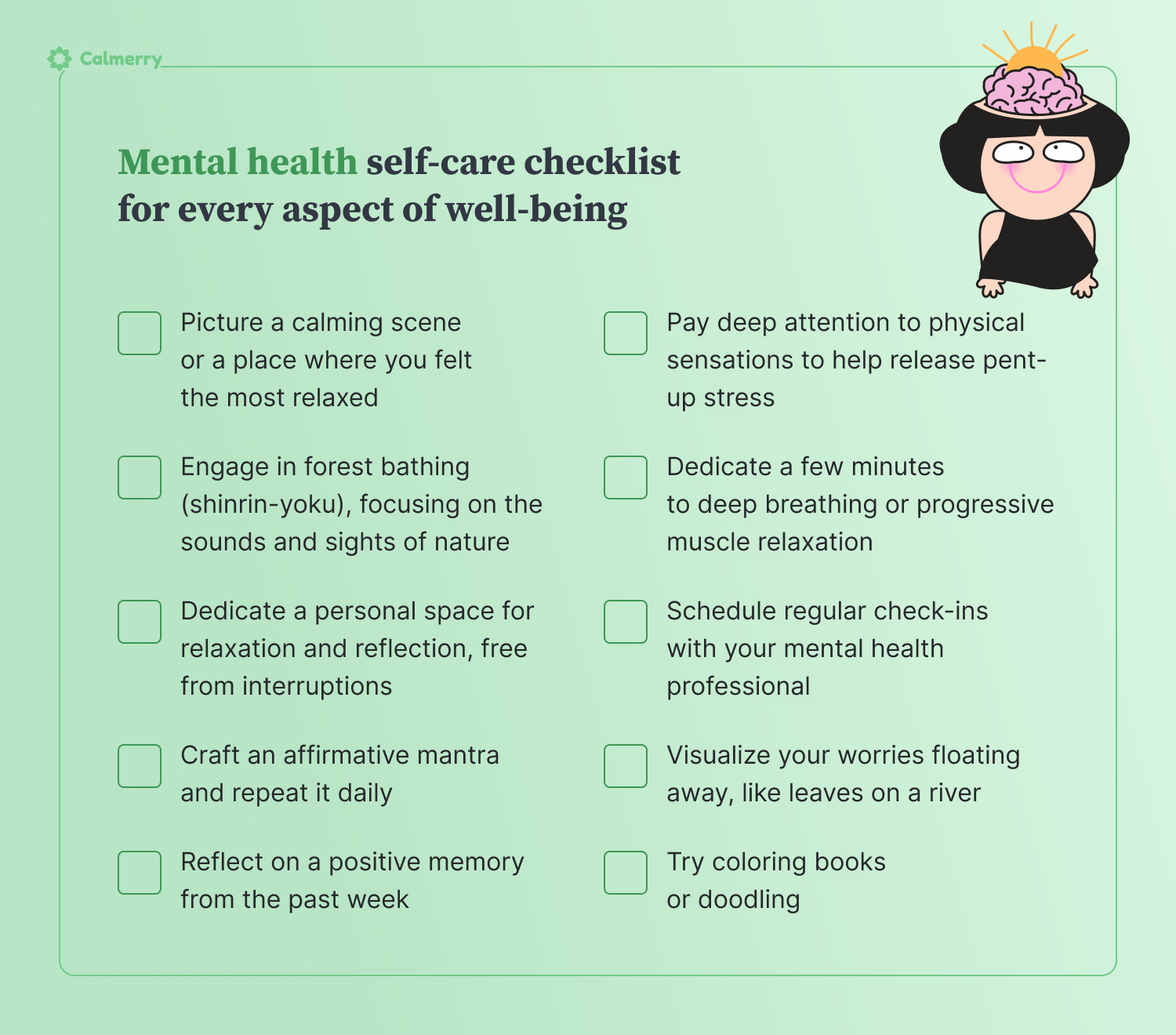
Physical health self-care
- Follow a 15-min morning stretch, focusing on the neck, back, and legs. Stretching can enhance circulation and alleviate muscle tension
- Take naps and breaks when you need them. Rest is essential for cellular repair and rejuvenation
- When exercising, mind your body needs, sensations, and limits
- Join a weekly yoga class to improve flexibility and calmness. Yoga combines mindful movement with deep breathing, enhancing mental and physical health
- Go for regular medical check-ups. Preventive care can detect potential issues early, ensuring longevity
- Choose sports activities that fit your mind, body, and soul for genuine enjoyment and commitment
- Dance at home, whenever you want and however you like
- Incorporate trusted apps that help you stay on track for structured guidelines and motivation
- Create bedtime rituals for sleep: dim lights, read, or sip herbal tea. Rituals signal the body to prepare for rest, improving sleep quality
- Even on tough days, aim for small steps in basic personal hygiene
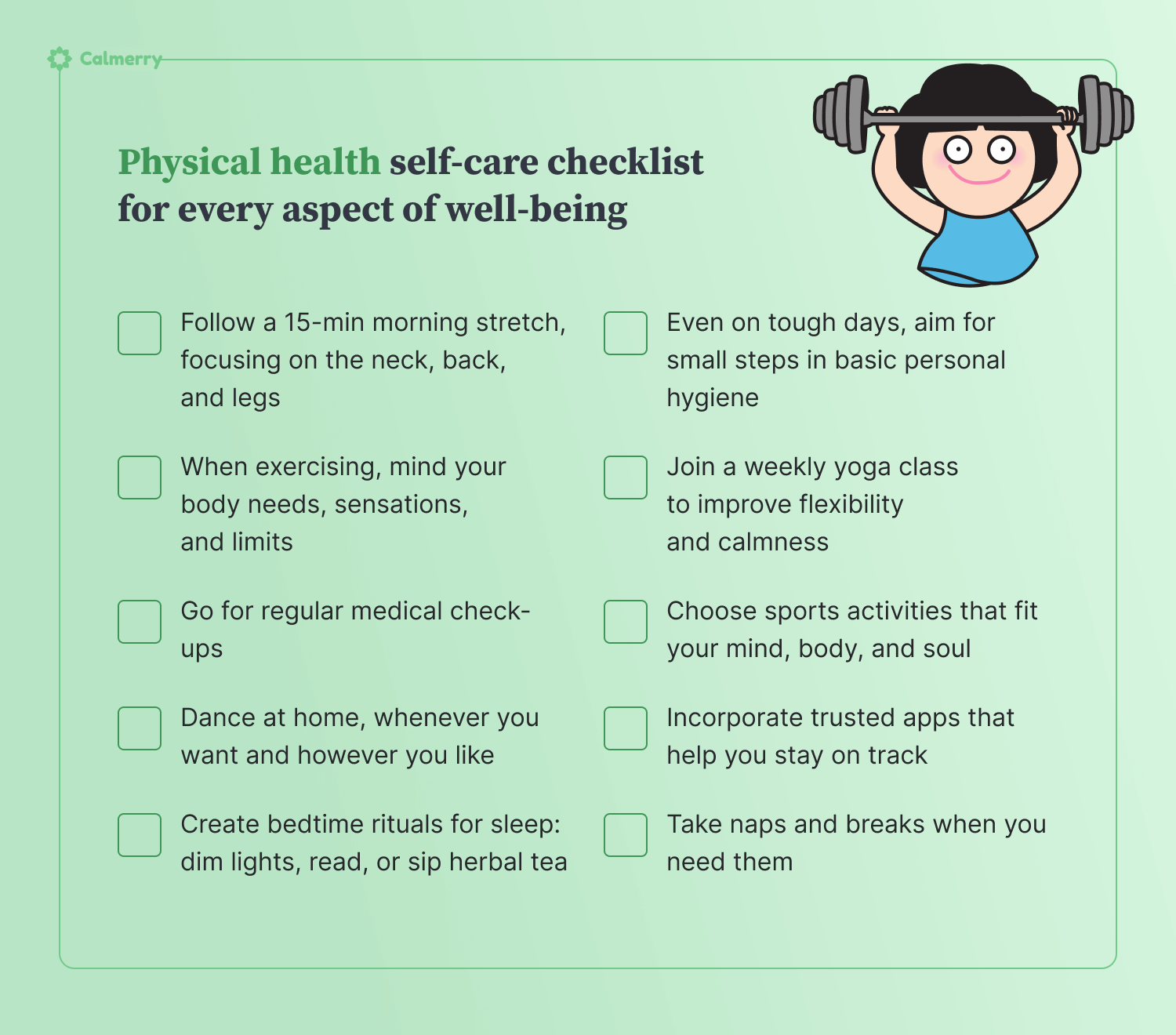
Social self-care
- Plan regular catch-ups with friends. Social connections release oxytocin, the bonding hormone
- Limit exposure to energy-draining people, nurturing connections that uplift
- Take breaks from social commitments when overwhelmed
- Volunteer in your community. Altruistic actions boost self-esteem and a sense of purpose
- Take a class or workshop in a group setting
- Go on a group retreat or trip with friends for deeper bonds and lasting memories
- Schedule regular “date nights” with your partner to strengthen romantic connections
- Reach out when feeling isolated, even via text. Connection, even minimal, can reduce feelings of loneliness
- Learn healthy communication tips. Effective communication forms the bedrock of fulfilling relationships
- Talk to a “no-judgment” friend on tough days. Venting can offer relief and clarity
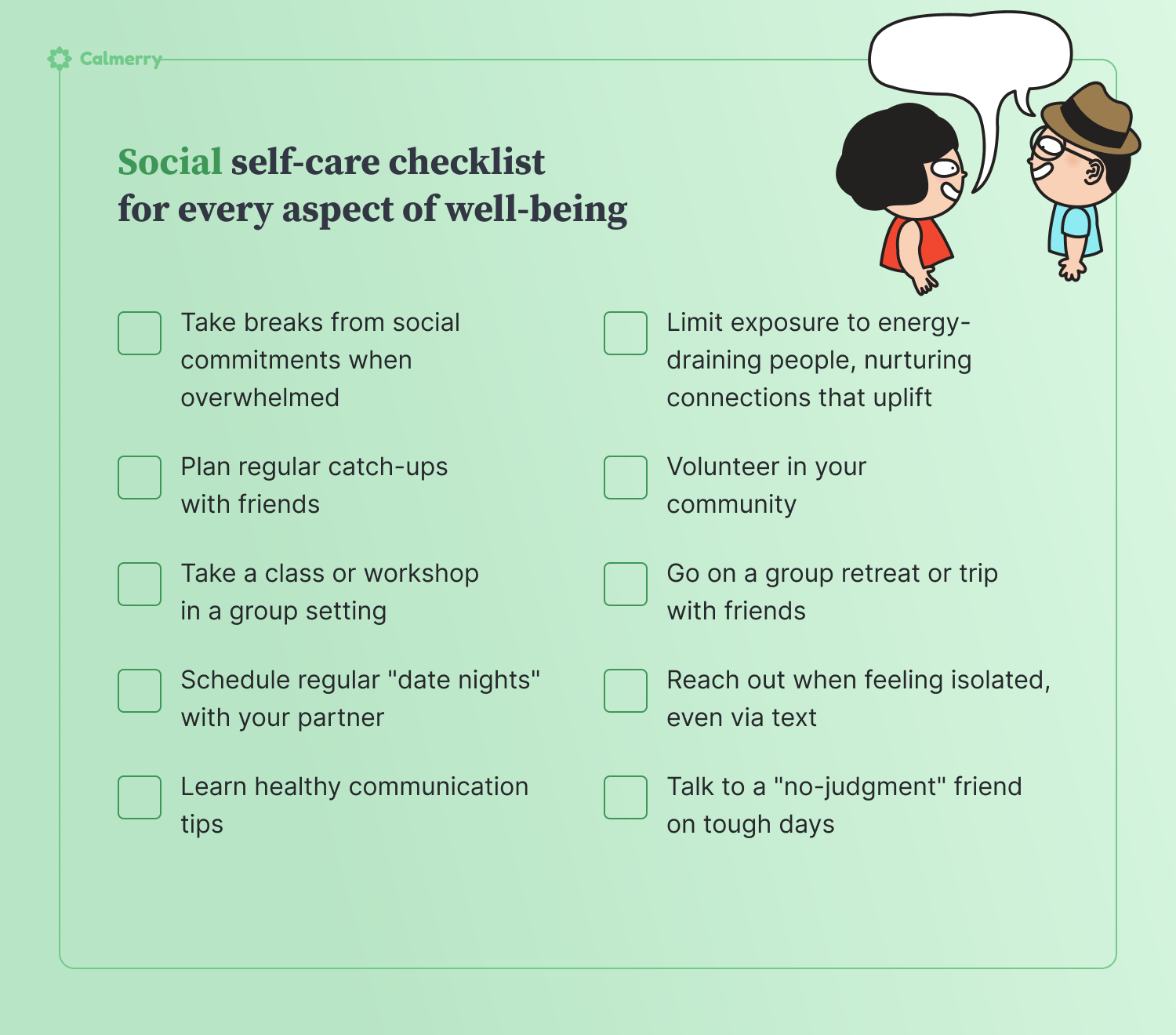
Emotional self-care
- Express your feelings through art or writing. Creative outlets provide a safe space for emotional exploration and expression
- Engage in activities that make you laugh. Laughter releases endorphins, which are natural mood boosters
- Take time to acknowledge, validate, and process emotions to foster emotional resilience
- Practice forgiveness towards yourself and others
- Journal daily to reflect on your emotions for clarity and self-awareness
- Listen to music that resonates with your mood
- Seek therapy or counseling for guided emotional exploration. Professionals offer tools and perspectives to navigate emotional challenges
- Create a “mood board” to visualize your feelings
- Use mindfulness or meditation to center yourself
- Take moments to self-soothe during emotional peaks
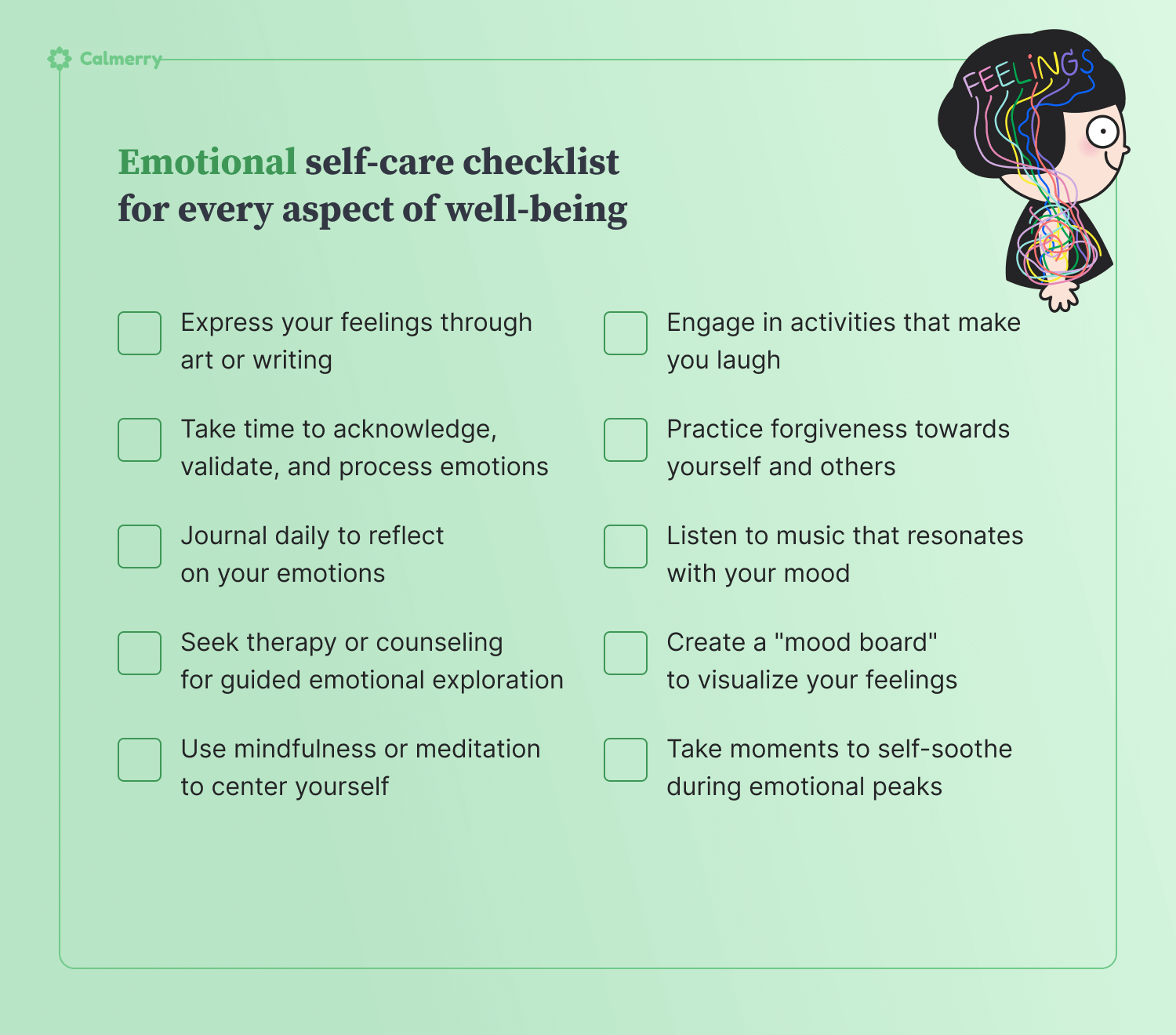
Spiritual self-care
- Engage in prayer or personal reflection time. Spiritual practices offer solace and can deepen inner connection
- Journal about your beliefs and values. Reflecting on core beliefs can reinforce purpose and direction
- Take nature walks to feel connected with the world
- Read spiritual literature or sacred texts
- Participate in community service or acts of kindness
- Set aside time for daily gratitude reflections. Gratitude shifts focus to life’s blessings, promoting contentment
- Attend workshops or retreats that align with your spiritual interests
- Connect with a spiritual mentor or guide. Guidance can offer clarity on the spiritual path
- Practice yoga or tai chi to combine physical and spiritual well-being
- Engage with a like-minded spiritual community or support group for shared growth
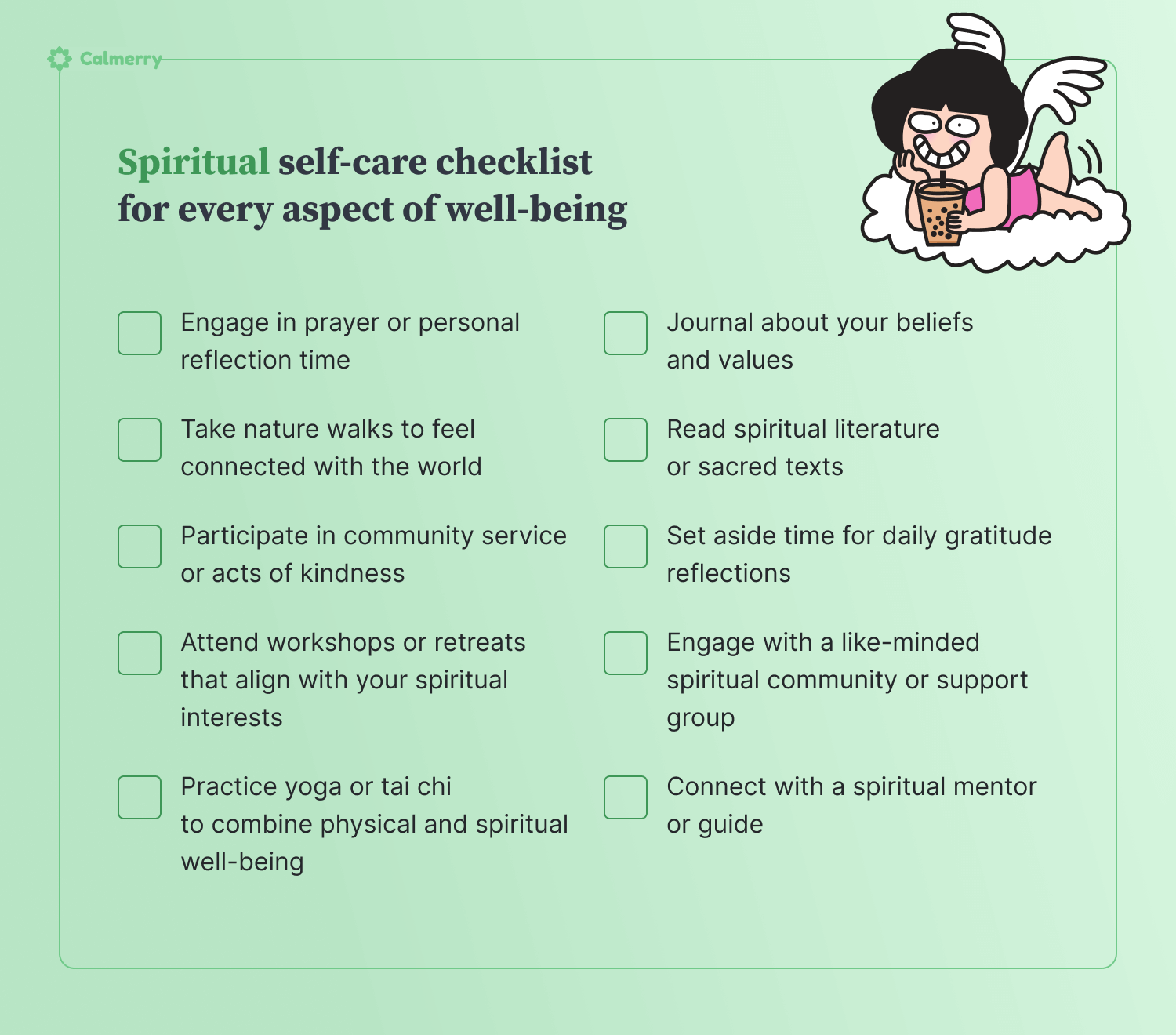
Professional/intellectual self-care
- Take regular breaks during work to rejuvenate the mind and productivity
- Set clear professional boundaries to ensure work-life balance
- Attend workshops or courses for personal growth. Continuous learning fosters intellectual expansion
- Network with peers in different fields for new ideas and perspectives
- Set and review your goals/aspirations/desires
- Organize and declutter your workspace for clarity and focus
- Seek mentorship or guidance for experience-based insights and direction
- Celebrate professional achievements to boost motivation and self-esteem
- Explore more interests/languages/skills.
- Prioritize mental health at your workplace
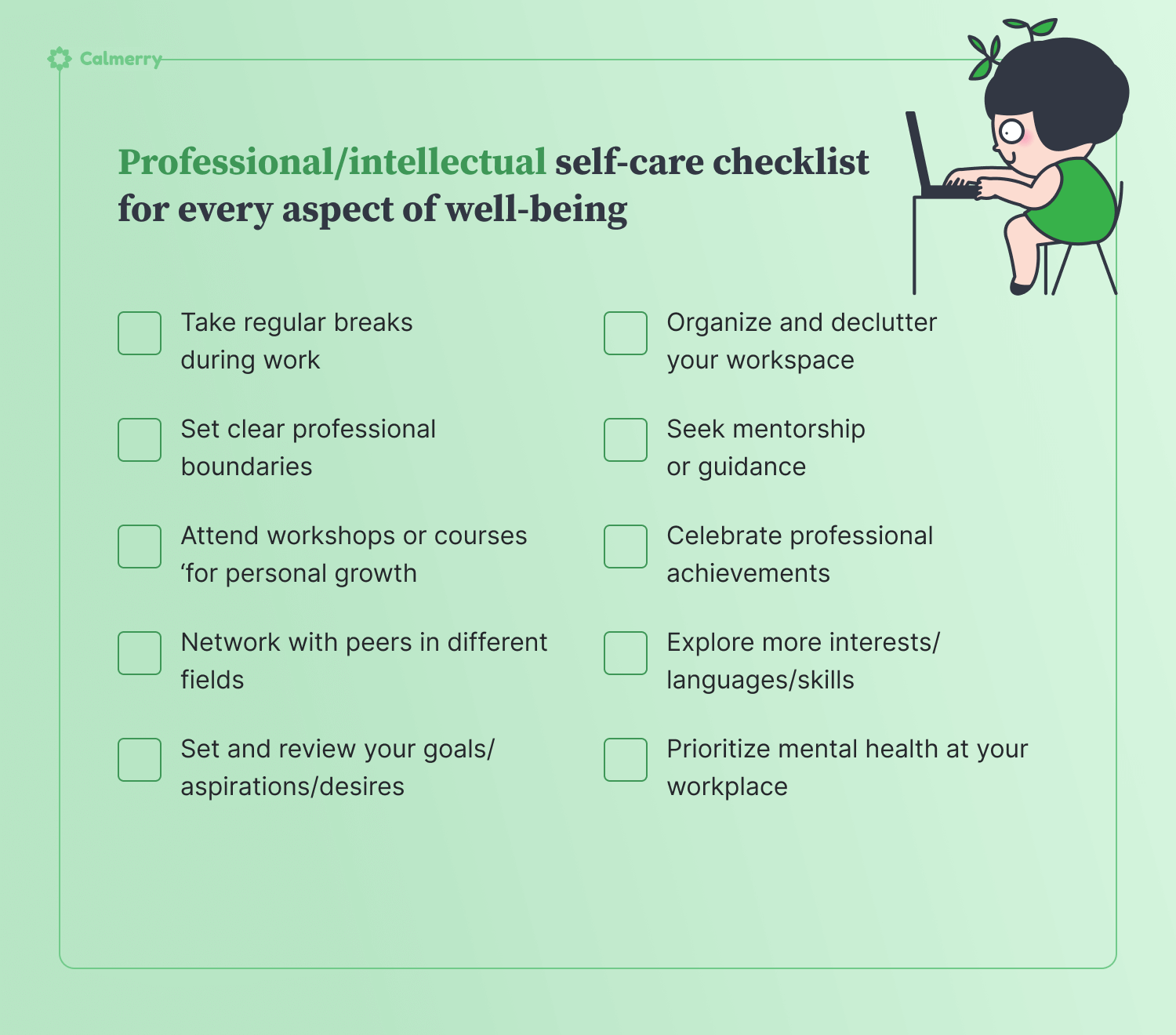
Financial self-care
- Create your personal budget
- Set financial goals
- Review and organize bills to prevent overspending and late fees
- Build an emergency fund. A safety net reduces stress during unforeseen events
- Set aside a certain amount for personal treats
- Consult with a financial advisor for informed financial decisions
- Educate yourself on investments. Knowledge reduces financial risks and maximizes returns
- Celebrate financial milestones. Recognizing progress reinforces healthy financial habits
- Monitor and improve your credit score for better financial opportunities.
- Periodically declutter and sell unused items for extra cash.
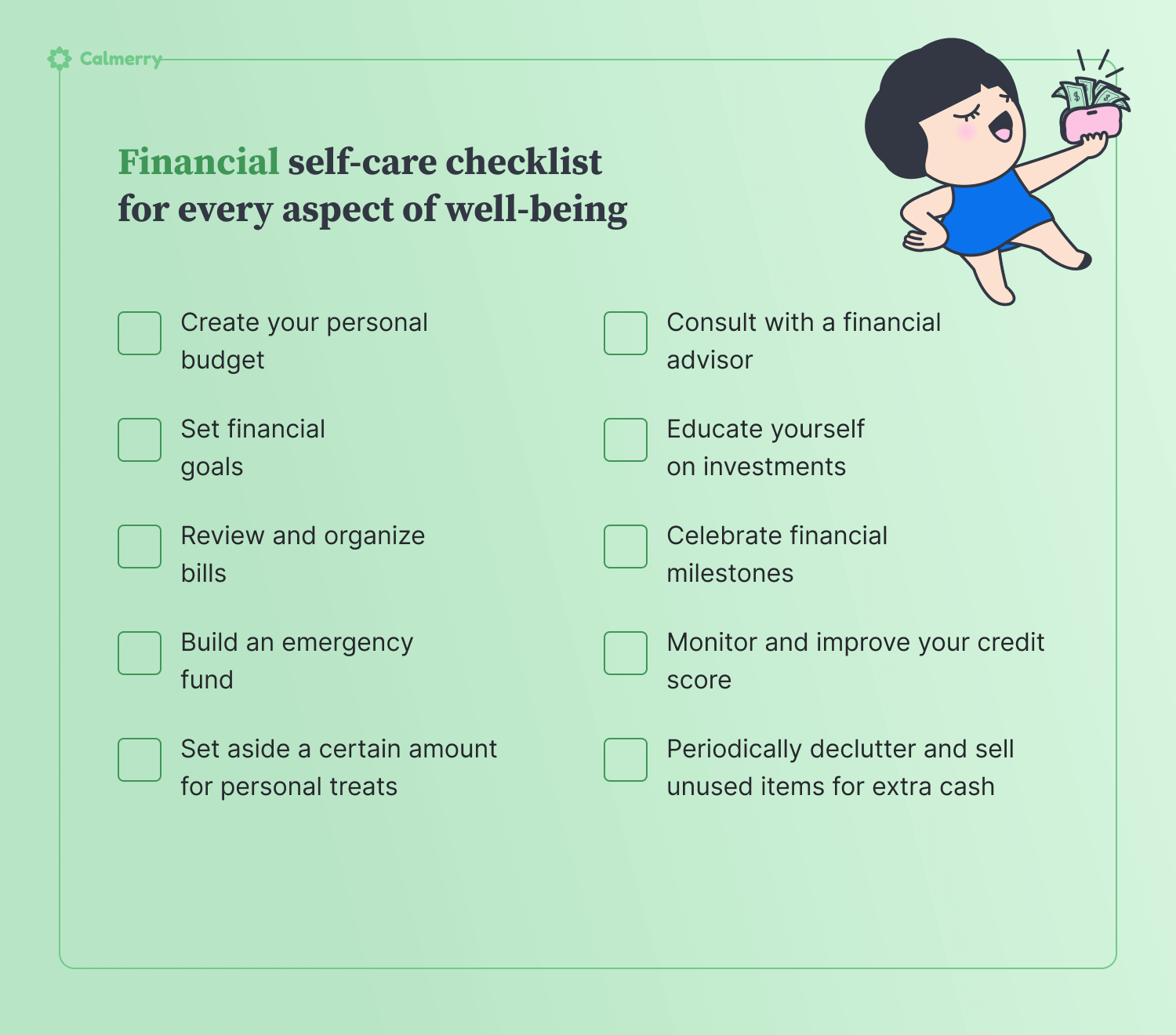
When to consider professional help
While the self-care activities listed can significantly enhance your well-being, there may be times when they aren’t enough.
If you find yourself persistently overwhelmed, anxious, burned out, or feeling down, it might be time to consider professional help. This is especially true if these symptoms interfere with your daily activities, relationships, or physical health.
Professionals, such as therapists, counselors, and doctors, have the expertise to provide coping strategies, tools, and guidance tailored to your specific needs. They offer a safe space to explore and address deeper concerns that might be affecting your well-being.
If you feel you need a deeper level of support, don’t hesitate to reach out. Calmerry’s mental health professionals are ready to guide you through any challenges you might be facing.
Investing in your mental well-being is a powerful act of self-care. Start your journey to a happier, more balanced life today.
Dfarhud D, Malmir M, Khanahmadi M. Happiness & Health: The Biological Factors- Systematic Review Article. Iran J Public Health. 2014 Nov;43(11):1468-77. PMID: 26060713; PMCID: PMC4449495. https://www.ncbi.nlm.nih.gov/pmc/articles/PMC4449495/
Nurtured by nature. (n.d.). https://www.apa.org. https://www.apa.org/monitor/2020/04/nurtured-nature
Mheslinga. (2023, August 30). How sleep affects human health, explained. University of Chicago News. https://news.uchicago.edu/explainer/how-sleep-affects-human-health-explained
Pacheco, D., & Pacheco, D. (2023). Bedtime Routines for Adults. Sleep Foundation. https://www.sleepfoundation.org/bedtime-routine-for-adults
What are the health benefits of altruism? (n.d.). Mental Health Foundation. https://www.mentalhealth.org.uk/what-are-health-benefits-altruism
Zhao J, Yin H, Zhang G, Li G, Shang B, Wang C, Chen L. A meta-analysis of randomized controlled trials of laughter and humour interventions on depression, anxiety and sleep quality in adults. J Adv Nurs. 2019 Nov;75(11):2435-2448. doi: 10.1111/jan.14000. Epub 2019 May 9. PMID: 30882915.
online therapy
live video session



